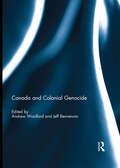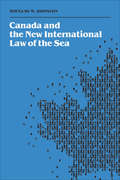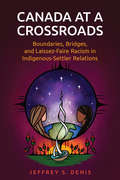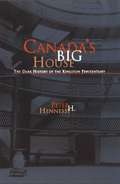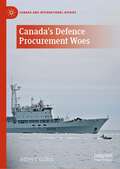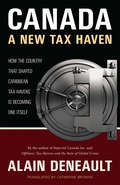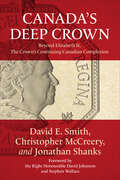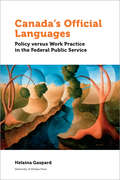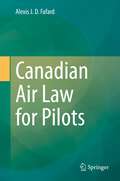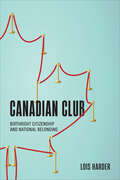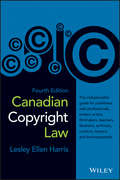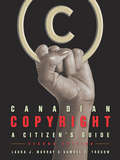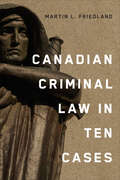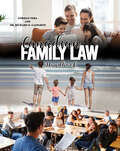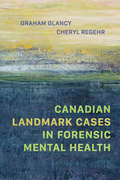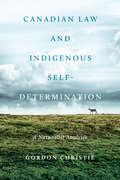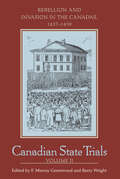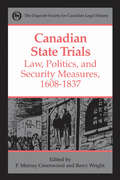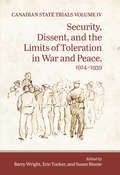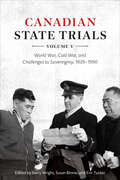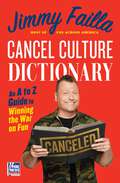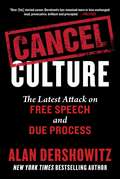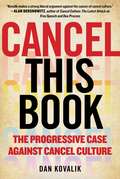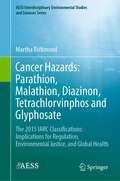- Table View
- List View
Canada and Colonial Genocide
by Andrew Woolford and Jeff BenvenutoSettler colonialism in Canada has traditionally been portrayed as a gentler, if not benevolent, colonialism—especially in contrast to the Indian Wars in the United States. This national mythology has penetrated into comparative genocide studies, where Canadian case studies are rarely discussed in edited volumes, genocide journals, or multi-national studies. Indeed, much of the extant literature on genocide in Canada rests at the level of self-justification, whereby authors draw on the U.N Genocide Convention or some other rubric to demonstrate that Canadian genocides are a legitimate topic of scholarly concern.In recent years, however, discussion of genocide in Canada has become more pronounced, particularly in the wake of the findings of the Truth and Reconciliation Commission of Canada. This volume contributes to this ongoing discourse, providing scholarly analyses of the multiple dimensions or processes of colonial destruction and their aftermaths in Canada. Various acts of genocidal violence are covered, including residential schools, repressive legal or governmental controls, ecological destruction, and disease spread. Additionally, contributors draw comparisons to patterns of colonial destruction in other contexts, examine the ways in which Canada has sought to redress and commemorate colonial harms, and present novel theoretical and conceptual insights on colonial/settler genocides in Canada. This book was previously published as a special issue of the Journal of Genocide Research.
Canada and the New International Law of the Sea
by Douglas JohnstonThis is the last of three volumes dealing with the International Legal Environment (see list in back of book), included in the Collected Research Studies of the Royal Commission on the Economic Union and Development Prospects for Canada. The Third United Nations Conference on the Law of the Sea (UNCLOS 3) culminated in the adopted of the United Nations convention on the law of the sea in 1982. Since then 150 countries, including Canada, have signed this historic treaty. It affects Canada's four major ocean industries: fishing, offshore petroleum, shipping and ocean mining. As Canada contemplates ratification of this agreement, it must consider these as well as several other maritime matters, including transit management, offshore development, marine-technology development and ocean-science policy. This volume delineates the issues and their implications for Canada's future at sea, and recommends the establishment of an independent advisory body to ensure serious and comprehensive treatment of maritime concerns.
Canada at a Crossroads: Boundaries, Bridges, and Laissez-Faire Racism in Indigenous-Settler Relations
by Jeffrey DenisDrawing on group position theory, settler colonial studies, critical race theory, and Indigenous theorizing, Canada at a Crossroads emphasizes the social psychological barriers to transforming white settler ideologies and practices and working towards decolonization. After tracing settlers’ sense of group superiority and entitlement to historical and ongoing colonial processes, Denis illustrates how contemporary Indigenous and settler residents think about and relate to one another. He highlights how, despite often having close cross-group relationships, residents maintain conflicting perspectives on land, culture, history, and treaties, and Indigenous residents frequently experience interpersonal and systemic racism. Denis then critically assesses the promise and pitfalls of commonly proposed solutions, including intergroup contact, education, apologies, and collective action, and concludes that genuine reconciliation will require radically restructuring Canadian society and perpetually fulfilling treaty responsibilities.
Canada's Big House: The Dark History of the Kingston Penitentiary
by Peter H. HennessyA report in 1833 by a committee of three respected Kingston colonials called for the construction of a limestone penitentiary on Hatter’s Bay to the west of the town. Their report contained these words of advice for its future governors: "…[shall] be a place by every means not cruel and not affecting the health of the offender, [but] shall be rendered so irksome and so terrible that during his lifetime he may dread nothing so much as a repetition of the punishment…" The obvious contradiction within this historical mandate of Canada’s Big House has bedevilled the entire history of the jail. Its original high moral purpose - penitence through silent reflection - drifted away into the foggy realm of official myth almost as soon as the first convicts arrived in 1835.This semi-documentary study of the Kingston Penitentiary by a local writer and historian lays bare in cool prose the rapid descent from puritanical purpose to merely punitive management. For the first 75 years, repression was accepted as the norm, even applauded, by the local citizens, some of the inmates, and the political establishment. Over the last hundred years, repressive practices at Kingston Peneitentiary have been publicized, analyzed, and increasingly denounced. In the outcome, the Big House at Kingston has become almost unmanageable. What to do with it? The question still hangs in the air.
Canada's Defence Procurement Woes (Canada and International Affairs)
by Jeffrey F. CollinsThis book challenges the perceived underlying causes and culprits of the ongoing challenges in Canadian defence procurement, arguing that although headlines often put the blame on the political leadership, the defence procurement bureaucracy, ongoing pressures in the defence industry and continuous demands placed on Canada though its alliances also carry a large part of the responsibility. Focusing on four main case studies: the Fixed Wing Search and Rescue Plane, the Joint Support Ships, the Medium Support Vehicle System and the Halifax Class Modernization, the author offers a comparative analysis of how these ongoing procurement efforts were dealt with by different administrations, from Jean Chrétien and Paul Martin to Stephen Harper.
Canada's Indigenous Constitution
by John BorrowsCanada's Indigenous Constitution reflects on the nature and sources of law in Canada, beginning with the conviction that the Canadian legal system has helped to engender the high level of wealth and security enjoyed by people across the country. However, longstanding disputes about the origins, legitimacy, and applicability of certain aspects of the legal system have led John Borrows to argue that Canada's constitution is incomplete without a broader acceptance of Indigenous legal traditions.With characteristic richness and eloquence, John Borrows explores legal traditions, the role of governments and courts, and the prospect of a multi-juridical legal culture, all with a view to understanding and improving legal processes in Canada. He discusses the place of individuals, families, and communities in recovering and extending the role of Indigenous law within both Indigenous communities and Canadian society more broadly. This is a major work by one of Canada's leading legal scholars, and an essential companion to Drawing Out Law: A Spirit's Guide.
Canada: A New Tax Haven
by Alain Deneault Catherine BrowneIn Canada: A New Tax Haven, Alain Deneault traces Canada's relationship with Commonwealth Caribbean nations back through the last half of the twentieth century, arguing that the involvement of Canadian financiers in establishing and maintaining Caribbean tax havens has predisposed Canada to become a tax haven itself - a metamorphosis well under way.Canada was linked to Caribbean nations long before they became tax havens. In the 1950s, an ex-governor of Canada's central bank attempted to establish a low taxation regime in Jamaica. In the 1960s, the transformation of the Bahamas into a tax haven characterized by impenetrable banking secrecy was shaped by a minister of finance who sat on the Royal Bank of Canada's board of directors. A Calgary lawyer and former Conservative Party heavyweight drew up the clauses that transformed the Cayman Islands into an opaque offshore jurisdiction. For years, Canadian politicians have debated annexing tax havens such as the Turks and Caicos Islands, making them part of Canadian territory. Canada has signed a free-trade agreement with Panama and is currently seeking a wider agreement with countries in CARICOM, the Caribbean economic community. And, notably, Canada currently shares its seat at the World Bank and the International Monetary Fund with a group of Caribbean tax havens.These exercises in fostering fiscal and banking leniency have predisposed Canada to become one of the most attractive tax havens to foreign interests. Not only does Canada offer one of the lowest corporate tax rates in the world, but a number of loopholes encourage companies to relocate to Canada as if it were Barbados or Bermuda.Canada: A New Tax Haven is an attempt to analyze the situation and address its implications for Canadians.
Canada’s Deep Crown: Beyond Elizabeth II, The Crown’s Continuing Canadian Complexion
by David Smith Christopher McCreery Jonathan ShanksThe Crown in Canada has had a profound influence in shaping a country and a constitution that embraces the promotion of political moderation, societal accommodation, adaptable constitutional structures, and pluralistic governing practices. While none of these features themselves originated through legislative or constitutional action, David E. Smith, Christopher McCreery, and Jonathan Shanks propose that all reflect the presence and actions of the Crown. Examining how a constitutional monarchy functions, Canada’s Deep Crown discusses how the legal and institutional abstractions of the Crown vary depending on the circumstances and the context in which it is found. The Crown presents differently depending on who is observing it, who is representing it, and what role it is performing. With a focus on the changes that have taken place over the last fifty years, this book addresses the role of the Crown in dispersing power throughout Canada’s system of government, the function the sovereign, governor general, and lieutenant governors play, and how the demise of the Crown and transition to a new sovereign is likely to unfold.
Canada’s Official Languages: Policy Versus Work Practice in the Federal Public Service (Politics and Public Policy)
by Helaina GaspardCanada’s official languages legislation fundamentally altered the composition and operational considerations of federal institutions. With legislative change, Canada’s public service has achieved the equitable representation of its two official languages groups, provided services to the public in both official languages, and has codified rights for public servants to work in their official language of choice. On paper, the regime is robust. In practice, there is a persistent divergence between policy and practice, as English dominates as the regular language of work in the federal public service. Through an historical institutionalist lens based on extensive archival research and semi-structured interviews, Gaspard shows that the implementation of official languages policy in the federal public service from 1967–2013 could not challenge the predominance of English as the operating language of the federal public service. The analysis of the roles of actors, ideas and institutions that influenced the policy implementation process show that a lack of structural change, inadequate managerial engagement, and a false sense that both official languages are equally ingrained in the public service explain the persistence of English as the dominant language of work.
Canadian Air Law for Pilots
by Alexis J.D. FafardCanada is a global aviation powerhouse. Thanks to the British Commonwealth Air Training Plan during World War II, as well as its internationally-recognized reputation enabling an important and meaningful bridge among the nations of the world after the war, Canada — called the Aerodrome of Democracy by President Franklin D. Roosevelt — was chosen as the host of the headquarters of the United Nations’ International Civil Aviation Organization (ICAO) and influential International Air Transport Association (IATA), and has become the third-largest aerospace hub in the world. Today, thousands of Canadian aviation professionals specializing in engineering, management, finance, sales, flight operations, academics, flight training, tax, and law staff the ICAO, IATA, governmental agencies, airline companies, law and aircraft leasing firms, universities, and gigantic aerospace corporations. This Canadian expertise also resonates in today’s global training pipeline of highly skilled professionals operating winged-tubes loaded with thousands of gallons of kerosene fuelling complex and powerful engine systems in the lower levels of the stratosphere to carry passengers and/or cargo across intercontinental airways.Canadian Air Law for Pilots is entirely dedicated to pilots; its purpose is twofold: (1) to highlight the landmark Canadian legislative framework relative to aviation law, and provide an extensive review of federal decision-makers affecting pilots’ privileges, rights, and interests by reporting on their purposes, procedural rules, as well as key case law within administrative and penal law; and (2) to outline Canada’s air law for local and international applicants and trainees interested in obtaining pilot permits, licences or ratings (aeroplanes) issued by Transport Canada.This textbook is divided into four parts: Part I: Administrative LawPart II: Penal LawPart III Aircraft in CanadaPart IV: Air Law
Canadian Club: Birthright Citizenship and National Belonging
by Lois HarderBirth-based citizenship is widely considered to be the most secure claim to political belonging. Despite the general belief that liberal democracies are formed through consent, in fact, most people are members of a political community by virtue of the circumstances of their birth. In Canadian Club, Lois Harder tracks the development of Canada’s Citizenship Act from its first iteration in 1947 to the provisions governing the citizenship of children born abroad to Canadian parents with the assistance of reproductive technologies. Reviewing a range of cases, Harder reveals how membership in the Canadian political community relies on norms surrounding gender, family, and sexuality, as well as presumptions regarding the constitution of "authentic" national identity, racial hierarchy, and the rightness of settler colonialism. Canadian Club concludes with a consideration of alternative approaches to forming political communities. Ultimately, it asks whether birth-based citizenship is the best we can do and what a more democratic and socially just alternative might look like.
Canadian Copyright Law
by Lesley Ellen HarrisAn updated guide to Canadian copyright law for an age of reckless infringementThis fourth edition of Canadian Copyright Law brings you the latest updates according to new Canadian legislation and international agreements. Copyright infringement has always been an invisible crime. Now with near-constant access to the Internet and the mainstream explosion of digital formats, copyright is one of the most important issues for creative professionals, consumers of that media, and those who work in related industries. The line between what is protected and what is "free" is blurring further, and the copyright issues are more complex than ever. Provides a complete update on copyright issues relating to digital media.Takes the convoluted legal jargon of the Canadian Copyright Act and sets it out in everyday language. Provides concrete examples to offer further clarification of complicated matters.Whether you are a creator or user of copyright material, Canadian Copyright Law will keep you current on copyright law in Canada and its applications to your situation--to protect your creations, content, and products in these rapidly changing markets.
Canadian Copyright: A Citizen’s Guide
by Laura J. Murray Samuel E. TrosowIn the age of easily downloadable culture, messages about copyright are ubiquitous. If you’re an artist, consumer, or teacher, copyright is likely a part of your everyday life. Completely updated, this revised edition of Canadian Copyright parses the Copyright Act and explains current Canadian copyright law to ordinary Canadians in accessible language, using recent examples and legal cases.
Canadian Criminal Law in Ten Cases
by Martin L. FriedlandCanadian Criminal Law in Ten Cases explores the development of criminal justice in Canada through an in-depth examination of ten significant criminal cases. Martin L. Friedland draws on cases that went to the Supreme Court of Canada or the Privy Council, including well-known cases such as those of Louis Riel, Steven Truscott, Henry Morgentaler, and Jamie Gladue. The book addresses such issues as wrongful convictions, the enforcement of morality, Indigenous experiences with criminal law, bail and trial delay, and the impact of the 1982 Charter of Rights and Freedoms on the criminal justice system. Friedland describes in a masterful way the factual background of each case and the political, social, and economic conditions of the time. Each character – the accused, judges, and counsel – is described in detail, as are the relevant laws and procedures. Friedland includes recommendations on how the criminal justice system can be improved, such as by creating a new federal commission devoted solely to criminal justice and by the enactment by Parliament of enhanced codes of evidence and criminal law and procedure. Canadian Criminal Law in Ten Cases is an indispensable guide to understanding the criminal justice system for lawyers, students, and anyone interested in criminal law and the administration of criminal justice.
Canadian Family Law Handbook
by Norman FeraThis book provides an easy-to-understand survey of family law across Canada. For those interested in Ontario or other provinces, perhaps working toward paralegal certification, this book provides all the relevant details of family law and competencies in an organized fashion using plain language. The latest amendments to the Divorce Act concerning decision-making responsibilities, parenting time, and contact orders are fully canvassed as are new requirements for moving or relocating, and the broader definition of family violence. Indeed, not all marriages and families are harmonious. There is a thorough review of domestic abuse and resulting trauma as well as legal remedies including peace bonds, restraining orders, and civil contempt. This book also examines the client-centered, trauma-informed, anti-racist approach to providing legal services.The laws of marriage (but not solemnization), annulment, and divorce are essentially the same no matter where you live in Canada. The first six chapters are very informative about those topics and issues of parenting, child support, and financial assistance for spouses. This book also deals with disputes concerning parenting responsibilities, support, and property division that arise when the parties never married but cohabited in a conjugal relationship of some duration prior to separation.While this book is not legal advice, it provides every reader with a solid grasp of their rights and obligations in family matters. And those who will qualify as legal advisers in family disputes will benefit from the breadth of the material and the comparative approach.
Canadian Landmark Cases in Forensic Mental Health (G - Reference,information And Interdisciplinary Subjects Ser.)
by Graham Glancy Cheryl RegehrHigh profile legal cases involving individuals with mental health challenges often involve complex issues that confront previous decisions of the courts, influence or change existing social policies, and ultimately have a profound impact on the daily practice of mental health professionals and the lives of their patients. Providing in-depth context into milestone cases in forensic mental health, this book addresses issues such as the confidentiality of mental health records, criminal responsibility, fitness to stand trial, the right of individuals to refuse mental health treatment, and the duty of mental health practitioners to warn and protect individuals who may be at risk of harm at the hands of a patient. The authors explore the social and political context in which these cases occurred, incorporating court decisions, contemporaneous media articles, and legal reviews in the analysis. Graham Glancy and Cheryl Regehr, who are experts in the field of Forensic Psychiatry, draw upon their own practice, in addition to scholarly literature, to describe the impact of the decisions rendered by the courts in the area of mental health, and offer practical guidelines for professionals working at the interface of law and mental health.
Canadian Law and Indigenous Self‐Determination: A Naturalist Analysis
by Gordon ChristieFor centuries, Canadian sovereignty has existed uneasily alongside forms of Indigenous legal and political authority. Canadian Law and Indigenous Self-Determination demonstrates how, over the last few decades, Canadian law has attempted to remove Indigenous sovereignty from the Canadian legal and social landscape. Adopting a naturalist analysis, Gordon Christie responds to questions about how to theorize this legal phenomenon, and how the study of law should accommodate the presence of diverse perspectives. Exploring the socially-constructed nature of Canadian law, Christie reveals how legal meaning, understood to be the outcome of a specific society, is being reworked to devalue the capacities of Indigenous societies. Addressing liberal positivism and critical postcolonial theory, Canadian Law and Indigenous Self-Determination considers the way in which Canadian jurists, working within a world circumscribed by liberal thought, have deployed the law in such a way as to attempt to remove Indigenous meaning-generating capacity.
Canadian State Trials
by F. Murray Greenwood Barry WrightThis second volume of the Canadian State Trials series focuses on the largest state security crisis in 19th century Canada: the rebellions of 1837-1838 and associated patriot invasions in Upper and Lower Canada (Ontario and Québec). Historians have long debated the causes and implications of the rebellions, but until now have done remarkably little work on the legal aspects of the insurrections and their aftermath. Given that over 350 men were tried for treason or equivalent offences in connection with the rebellions, this volume is long overdue.The essays collected here, written by prominent Canadian historians, legal scholars, and archivists, break new ground in the existing historiography of the rebellions by presenting the first comprehensive examination of the legal dimensions of the crises. In addition to examining trials and court martial proceedings, the essays examine their political, social, and comparative contexts, including the passage of emergency legislation and executive supervision of legal responses, the treatment of women, and the plight of political convicts transported to the Australian penal colonies. Canadian State Trials, Volume Two contributes significantly to the ongoing reassessment of the rebellion period.
Canadian State Trials Volume I: Law, Politics, and Security Measures, 1608-1837
by Barry Wright Frank Murray Greenwood]State trials reveal much about a nation's insecurities and shed light on important themes in political, constitutional, and legal history. In Canada, perceived and real threats to the state have ranged from dissent, disaffection, and the emergence of threatening ideologies to insurrection, riot, violent protest, and military invasion. The Canadian State Trials series will explore the role of the law in regulating such threats, from the period of early European settlement to 1971. The first volume and the planned series as a whole present a great deal of new material by prominent Canadian historians and legal scholars. Although certain Canadian political trials and security crises have received scholarly attention in the past, there has never been a comprehensive and systematic examination of the country's surprisingly rich record in this area. The eighteen essays in Volume I examine this record for the period 1608-1837, covering proceedings in New France, the four Atlantic colonies, the Old Province of Quebec, and the two Canadas. They highlight security law during the American revolution, the wars against revolutionary/Napoleonic France, and the War of 1812; comparative treason law; and the trials of David McLane, Robert Gourlay, Francis Collins, and Joseph Howe, among others. The essays, which extensive use of primary sources (the most illuminating of which appear in a documentary appendix), place the examination of the law and its administration during these events in socio-political and comparative context.
Canadian State Trials, Volume IV
by Eric Tucker Barry Wright Susan BinnieThe fourth volume in the Canadian State Trials series examines the legal issues surrounding perceived security threats and the repression of dissent from the outset of World War One through the Great Depression. War prompted the development of new government powers and raised questions about citizenship and Canadian identity, while the ensuing interwar years brought serious economic challenges and unprecedented tensions between labour and capital. The chapters in this edited collection, written by leading scholars in numerous fields, examine the treatment of enemy aliens, conscription and courts martial, sedition prosecutions during the war and after the Winnipeg General Strike, and the application of Criminal Code and Immigration Act laws to Communist Party leaders, On to Ottawa Trekkers, and minority groups. These historical events shed light on contemporary dilemmas: What are the limits of dissent in war, emergencies, and economic crisis? What limits should be placed on government responses to real and perceived challenges to its authority?
Canadian State Trials, Volume V: World War, Cold War, and Challenges to Sovereignty, 1939–1990 (Osgoode Society for Canadian Legal History)
by Wright, Tucker, and BinnieThe fifth and final volume of the Canadian State Trials series examines political trials and national security measures during the period of 1939 to 1990. Essays by historians and legal scholars shed light on experiences during the Second World War and its immediate aftermath, including uses of the War Measures Act and the Official Secrets Act with the unfolding of the Cold War and legal responses to the FLQ (including the October Crisis), labour strikes, and Indigenous resistance and standoffs. The volume critically examines the historical and social context of the trials and measures resulting from these events, concluding the first comprehensive series on this important area of Canadian law and politics. The fifth volume’s exploration of state responses to real and perceived security threats is particularly timely as Canada faces new challenges to the established order ranging from Indigenous nations demanding a new constitutional framework to protestors challenging discriminatory policing and contesting public health measures. (Osgoode Society for Canadian Legal History)
Cancel Culture Dictionary: An A to Z Guide to Winning the War on Fun
by Jimmy FaillaYou may know Jimmy Failla as the best dressed man in cable news. A force multiplier of positive energy on the radio who sounds like he gets paid in Tequila and Tide Pods. But he’s also a former New York City Taxi Driver who’s spent countless hours conversing with people from all over this planet and several planets you’ve never heard of. It’s those chats with hobbits, hookers, and time travelers that fill The Cancel Culture Dictionary with the unique perspective and savage self-awareness we need to escape the outrage era society is stuck in. Let’s face it. Life in this country was WAY better before the Smart Phone came along and made us infinitely dumber. Social Media has turned our “shining city on a hill” into a Real Housewives episode on Bravo where every day is a constant cat fight about politics. Weaponized censorship and runaway speech policing has left many people unable to tell the difference between a comedian and a criminal. Although to be fair, sometimes they’re the same, in Bill Cosby’s case. But if there’s one thing we can all be sure of, it’s that spending the past 10 years with our faces glued to our phones has made us crankier, crazier, and much fatter, despite what the Instagram Filters show you.This book is a collection of naughty jokes and nutty people whose stories guide us to a world where we don’t spend all day slugging it out on Twitter, X, or whatever dumb name Elon Musk gives it next time he gets stoned. No, it's not an actual dictionary, although the author should probably spend more time reading one. Think of it as a ridiculous roadmap to a time where life didn’t revolve around the Republican Party and the Democratic Party because we were all too focused on The Keg Party. And unlike other works devoted to the cancel craze, we'll show how the people who lost the most with each celebrity firing were everyday Americans who had nothing to do with it.Cancel Culture and the outrage era have dragged us all into a war on fun. But this book is not a call to arms, girlfriend. If anything, it’s a call to chill the f**k out. So hop in, shut the door, and don’t waste time fiddling with the seatbelt. The way we’re about to drive, it can’t help you anyway.
Cancel Culture: The Latest Attack on Free Speech and Due Process
by Alan DershowitzIn Cancel Culture, Alan Dershowitz—New York Times bestselling author and one of America&’s most respected legal scholars—makes an argument for free speech, due process, and restraint against the often overeager impulse to completely cancel individuals and institutions at the ever-changing whims of social media-driven crowds. Alan Dershowitz has been called &“one of the most prominent and consistent defenders of civil liberties in America&” by Politico and &“the nation&’s most peripatetic civil liberties lawyer and one of its most distinguished defenders of individual rights&” by Newsweek. Yet he has come under intense criticism for his steadfast and consistent championing of those same principles, and his famed &“shoe‑on‑the‑other‑foot test,&” to those who have been &“cancelled&” for any number of faults, both real and imagined. Cancel Culture is a defense of due process, free speech, and even-handedness in the application of judgment. It makes the case for restraint and care in decisions about whom and what to cancel, boycott, deplatform, and bar from public life, and offers recommendations for when, why, and to what degree these steps may be appropriate, as long as objective, fair-minded criteria can be determined and met. While Dershowitz argues against the worst excesses of cancel culture—the rush to judgment and the devastating results it can have on those who may be innocent, the power of social media to effect punishment without a thorough examination of evidence, the idea that historical events can be viewed through the same lens as actions in the present day—he also acknowledges that its defenders ostensibly try to use it to create meaningful, positive change, and notes that cancelling may itself be a constitutionally protected form of free speech. In the end, Cancel Culture represents an icon in the defense of free speech and due process reckoning with the greatest challenge and threat to these rights since the rise of McCarthyism. It is essential reading for anyone interested in or concerned about cancel culture, its effects on our society, and its significance in a greater historical and political context.
Cancel This Book: The Progressive Case Against Cancel Culture
by Dan KovalikExamining a phenomenon that is sweeping the country, Cancel This Book shines the spotlight on the suppression of open and candid debate. The public shaming of individuals for actual or perceived offenses, often against emerging notions of proper racial and gender norms and relations, has become commonplace. In a number of cases, the shaming is accompanied by calls for the offending individuals to lose their jobs, positions, or other status. Frequently, those targeted for &“cancellation&” simply do not know the latest, ever-changing norms (often related to language) that they are accused of transgressing—or they have honest questions about issues that have been deemed off-limits for debate and discussion. Cancel This Book offers a unique perspective from Dan Kovalik, a progressive author who supports the ongoing movements for racial and gender equality and justice, but who is concerned about the prevalence of &“cancelling&” people, and especially of people who are well-intentioned and who are themselves allied with these movements. While many progressives believe that &“cancelling&” others is a form of activism and holding others accountable, Cancel This Book argues that &“cancellation&” is oftentimes counter-productive and destructive of the very values which the &“cancellers&” claim to support. And indeed, we now see instances in the workplace where employers are using this spirt of &“cancellation&” to pit employees against each other, to exert more control over the workforce and to undermine worker and labor solidarity. Kovalik observes that many progressives are quietly opposed to this &“Cancel Culture&” and to many instances of &“cancellation&” they witness, but they are afraid to air these concerns publicly lest they themselves be &“cancelled.&” The result is the suppression of open debate about important issues involving racial and gender matters, and even issues related to how to best confront the current COVID-19 pandemic. While people speak in whispers about their true feelings about such issues, critical debate and discussion is avoided, resentments build, and the movement for justice and equality is ultimately disserved.
Cancer Hazards: The 2015 IARC Classifications: Implications for Regulation, Environmental Justice, and Global Health (AESS Interdisciplinary Environmental Studies and Sciences Series)
by Martha RichmondThis book focuses on a monograph published in 2017 by the International Agency for Research on Cancer (IARC), an agency of the World Health Organization (WHO), discussing its carcinogen hazard classification of four pesticides: parathion, malathion, diazinon, and tetrachlorvinphos as well as the herbicide glyphosate. The monograph provided a detailed discussion of considerations and conclusions made by a group of experts who met in 2015 to evaluate these compounds. Although not universally true, many of these substances, from the time of their commercial introduction to their present-day use, have spread significantly in the environment, affecting animals and plants in the larger ecosystem, the overall health of the environment, and human health. This book develops each of these issues before turning to the IARC review process, both the general process and its evolution over time, and compound selection criteria and deliberations regarding the substances discussed in the 2017 monograph. Final book sections detail scientific and private sector reactions to and implications of the IARC classifications. Hazard identification is contrasted with various models of quantitative risk assessment. The last chapters highlight the importance of hazard identification for members of domestic and global underserved communities involved in farming and landscape work, where exposures may vary widely, are not well-regulated, and where health outcomes are often not carefully documented.
